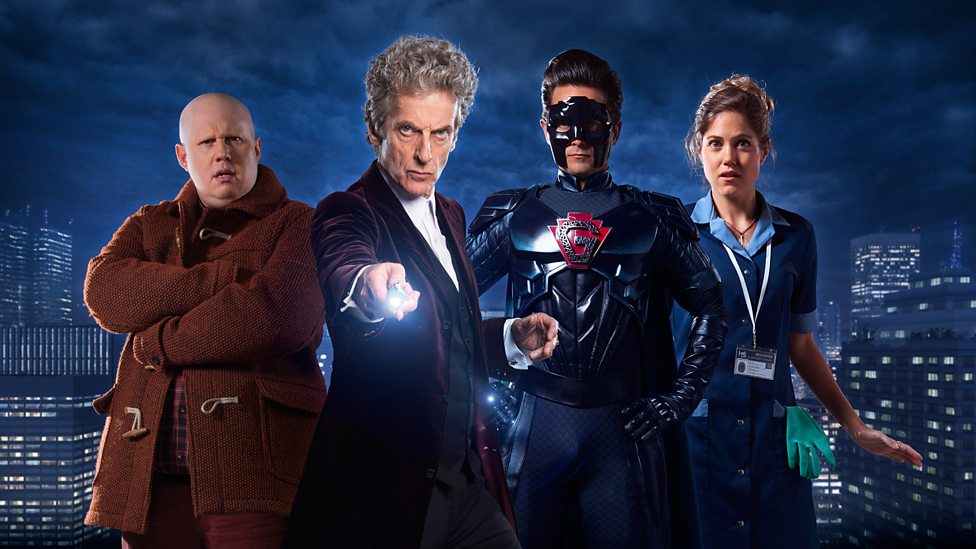**This is a spoilery review.**
You can tell, watching “Extremis,” that Steven Moffat thinks he’s very clever. It’s a Moffat episode through and through, with all the self-satisfied smugness and overwrought convolutions that come along with that. The thing is, “Extremis” isn’t experimental or groundbreaking or particularly intriguing. It’s what amounts to a dream sequence mashed together with an extended flashback. Which is fine. But there’s not much actual story here, just exposition about the past and set-up for the future, none of which is nearly as compelling as Steven Moffat seems to think it is.
Perhaps the most significant part of the episode, if only because it’s the part of the episode that’s easiest to make good sense of, is the flashbacks that work on multiple levels. Most viewers have been saying for weeks that the vault under the university must contain Missy, and this is confirmed in “Extremis.” While it’s not clear what for (and it could be any number of things, really), sometime shortly after the end of the Doctor’s time on Darillium Missy is sentenced to death, and the Doctor is summoned to be her executioner. While the Doctor hems and haws about whether he should pull the kill lever and Missy begs for her life, Nardole shows up and reads to the Doctor from River Song’s diary. He’s been sent by River to take care of the Doctor, which explains why he’s been lurking around all season, just waiting for this episode to have something important to do.
The other half of the episode finds the Doctor (seemingly) called upon by no less personage than the Pope himself to help translate an important religious text. It’s this part of the episode that is most frustratingly Moffat-eque, falling apart to a large degree if you think about it for more than a minute. There are some great moments, both humorous and dramatic, and we’re introduced to a menacing new enemy of humanity, but the truth is that the Veritas and the Doctor’s quest to understand it just doesn’t add up to anything that makes much sense at all. In the end, we learn that what we’ve been watching is simply a simulation being run by an invading species of aliens to work through how they’re going to get past Earth’s defenses. As other characters commit suicide in droves at their realization of their own unreality and his friends simply dissolve into pixels, the AI Doctor inside the simulation puts it all together and turns out to be so lifelike that his own way of dealing with unreality is to send an email to the real Doctor and let him know what’s going on, setting up what seems to be the big bad of the season.
Unfortunately, none of this holds up to much scrutiny. The biggest unanswered question, though, is a simple one, and the lack of an answer undermines the whole premise of the episode: If what we are watching, for most of the episode, is a simulation put on by aliens with a plan to invade Earth, and the real Doctor doesn’t find out about any of this until the end of the episode when the simulation Doctor contacts him, where did the invading aliens get the data for their simulation? And if they can either access data (such as the Doctor’s blindness) that only the Doctor and Nardole know about and they can build a meticulously lifelike simulation for their purposes, are they seriously still limited by a quirk of random number generation? Also, they can’t lock down their network so that their own AIs can’t become self-aware and contact real people outside the simulation? It’s such a common Moffat-era Who problem that complaints about it are frankly just banal at this point.
In the end, “Extremis” isn’t nearly as profound or experimental as Steven Moffat intends it to be, but it nonetheless manages to be entertaining. The Pope and several Cardinals pouring out of Bill’s bedroom to interrupt her date is legit hilarious, even if it does happen in the simulation. The Doctor’s suggestion to Bill that she go for it with real life Penny, even though Bill thinks Penny is out of her league, is sweet. Michelle Gomez is a constant delight as Missy. There are some interesting ideas about religion and faith being explored, even if only in the most facile manner. Like many a Moffat-penned episode, “Extremis” is fine as long as one doesn’t think too hard about it.
Miscellany:
- One Moffat-era trope I wish would disappear forever is people all over the universe being absolutely terrified of the Doctor’s wrath after basically reading the first page of his Google search results. It’s tiresome and patronizing, and the Doctor isn’t actually that dangerous unless you’re a Dalek.
- I hope we get to see more of Bill with Penny, who seems nice.
- The visual comparison of River Song’s diary to a Bible is potentially interesting, but it’s pretty much left at that.
- After last week’s episode using zombie imagery of a kind, it seemed redundant to have this one do the same, even if it was a different take on the zombie look and especially if these zombie aliens are going to make another appearance or two.










